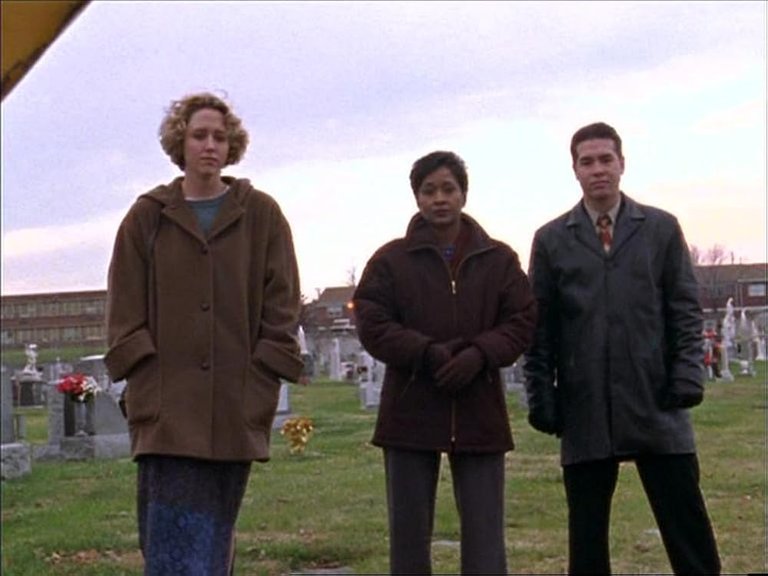
Truth Will Out (S07E16)
Airdate: 26 March 1999
Written by: Anya Epstein
Directed by: Keith Samples
Running Time: 43 minutes
By the second half of its seventh and final season, Homicide: Life on the Street had all but exhausted its creative momentum, revealing a production team increasingly reliant on formula and desperation as its conclusion loomed. Once celebrated for its unflinching, gritty portrayal of Baltimore’s urban underbelly through the lens of a flawed yet human police unit, the series had devolved into a conventional crime drama steeped in clichés. The show’s earlier brilliance lay in its willingness to blur the lines between procedural rigor and moral ambiguity, but by this point, its scripts leaned heavily on recycled tropes, half-baked subplots, and contrived attempts to recapture ratings. Even episodes that might have harboured potential originality—such as Truth Will Out—felt like retreads of earlier material, stripped of the nuance that once defined the series.
The episode centres on yet another cold case, a trope so overused by this stage that it had lost its capacity to intrigue. Josephine Pitt (Brooke Smith), a woman in her thirties, arrives at the Homicide Unit demanding a reopened investigation into her brother’s 1972 death. The case, initially handled by Lt. Giardello (Yaphet Kotto) when he was a young detective, concluded with Josephine, then aged three, accused of accidentally killing her 18-month-old sibling while they both were in a bathtub. Now, Josephine suspects her family’s story was fabricated and pleads for the truth. Detectives Falsone (Jon Seda) and Stivers (Toni Lewis) are assigned to the case, uncovering that the medical examiner, Mark Harlow (Stuart Horowitz), had a history of alcoholism and incompetence. This revelation prompts an exhumation, which confirms the child’s skeleton bears signs of repeated trauma. The mother, Madeline (Elizabeth Ashley) eventually faces charges after detectives uncover inconsistencies. While the plot offers a superficially gripping mystery, its execution is hamstrung by predictability and weak forensic logic, rendering the climax more melodramatic than satisfying.
Parallel to the cold case is a subplot involving Detective Bayliss (Kyle Secor), whose personal life becomes the subject of office gossip after his website exploring Buddhism and bisexuality is discovered. Lt. Giardello warns him that his openness about his sexuality risks professional repercussions. Initially defiant, Bayliss relents after Sergeant Fisk (Michael Ford)—a former romantic interest—publicly shuns him in a homophobic outburst. Bayliss then deletes his site, resolving the conflict with unconvincing haste.
Scriptwriter Anya Epstein attempts to justify the episode’s reliance on the cold-case trope through a meta-reference: Josephine claims her determination to reopen the case was inspired by Detective Falsone’s resolution of a 1930s murder in the earlier episode Finnegan’s Wake. This self-aware nod to the show’s own history, however, feels forced and insufficient. The mystery itself is paper-thin, offering only two possible outcomes: either Giardello was initially correct in blaming Josephine, or Madeline is a monstrous child-killer. The script opts for the latter, prioritising melodrama over plausibility. Giardello’s subsequent guilt trip—over his past missteps and familial failures—feels tacked-on, shoehorning emotional beats where none are earned.
The subplot involving Bayliss’s bisexuality, while potentially rich with narrative possibilities, is ultimately handled with a lack of subtlety and depth. Over the course of the series, Bayliss evolved from a relatable rookie serving as the audience’s entry point into the chaotic world of the Homicide Unit, to a caricature of eccentricity. The episode compresses the themes of homophobia and prejudice into a short timeframe, resolving Bayliss’s internal conflict through the overly dramatic act of deleting his website. Furthermore, the subplot is awkwardly linked to the tiresomely romance between Falsone and Detective Ballard (Callie Thorne), a subplot that had overstayed its welcome long before this episode.
Despite its structural flaws, Truth Will Out benefits from strong performances, particularly from Brooke Smith as Josephine and Elizabeth Ashley as the chillingly detached Madeline. The direction is serviceable, though it cannot salvage a script that prioritises emotional manipulation over coherence. The episode’s biggest failing lies in its inability to recapture the show’s earlier ambition. Homicide had once thrived on its willingness to interrogate moral ambiguity and institutional rot without tidy resolutions, but here it settles for melodrama and cliché.
Truth Will Out's attempts to blend mystery, character drama, and social commentary are hampered by weak writing, predictable twists, and a lack of faith in the audience’s patience. While the performances and technical execution hold up, the episode underscores the show’s precipitous decline from a groundbreaking procedural to a tired, formulaic relic. Fans hoping for a fitting finale will find little to satisfy, as the series ends not with a defiant bang but a whimper of missed opportunities.
RATING: 5/10 (++)
Blog in Croatian https://draxblog.com
Blog in English https://draxreview.wordpress.com/
InLeo blog https://inleo.io/@drax.leo
Hiveonboard: https://hiveonboard.com?ref=drax
Rising Star game: https://www.risingstargame.com?referrer=drax
1Inch: https://1inch.exchange/#/r/0x83823d8CCB74F828148258BB4457642124b1328e
BTC donations: 1EWxiMiP6iiG9rger3NuUSd6HByaxQWafG
ETH donations: 0xB305F144323b99e6f8b1d66f5D7DE78B498C32A7
BCH donations: qpvxw0jax79lhmvlgcldkzpqanf03r9cjv8y6gtmk9



